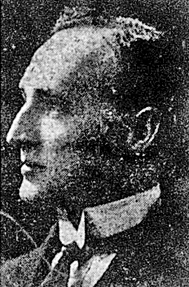Mr Albert E. Wray, the Luton Tramways Manager, has accepted a responsible position with the firm of Dick, Kerr & Co, general engineers, who have works in various parts of the United Kingdom for the manufacture of generating plants, tramways etc.
He resigned his Luton position this week, only after repeated pressure from his firm to remain, and he is due to commence in his new post in February. He will act in an advisory capacity in the traction department of Dick, Kerr's engineering staff.
 Mr Wray (pictured) came to Luton in 1915 from Gravesend, where he was an engineer and manager to an important tram and bus system. Prior to that he was assistant manager and chief engineer to the South Metropolitan Tramways & Lighting Co.
Mr Wray (pictured) came to Luton in 1915 from Gravesend, where he was an engineer and manager to an important tram and bus system. Prior to that he was assistant manager and chief engineer to the South Metropolitan Tramways & Lighting Co.
It cannot be said that Mr Wray's stay in Luton has been of the happiest character so far as his work is concerned. He has worked against almost insurmountable and heartbreaking difficulties and, while criticising the condition of our tramway system, all have been more than ready to admit that it would have been much worse but for the skilful direction of Mr Wray.
In an interview with a Telegraph representative, Mr Wray said: “I say definitely that the best thing for the public of Luton is that the Corporation should take over the undertaking. They have everything to gain and nothing to lose. I am firmly of opinion that the Council must inevitably take it over, for the growth of the town will depend solely on the means of transportation.
“In connection with a good tramway system there will be the necessity for a service of motor buses linking up the outside districts, and running to St Albans and other places. It will not mean making a lot of money, but it will be a right step in meeting the public needs. The possibilities of the undertaking are great, if taken over and developed in the manner which I have explained to the town's Tramways Committee.
“The public cannot realise what I have had to contend with in Luton. The system depends on the human element, and it is in this way that disorganisation occurs. Owing to labour difficulties we could not take the necessary disciplinary action.”
[Beds & Herts Saturday Telegraph: January 18th, 1919]

